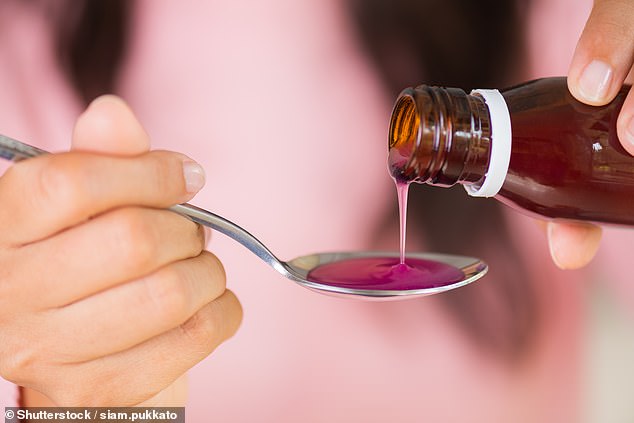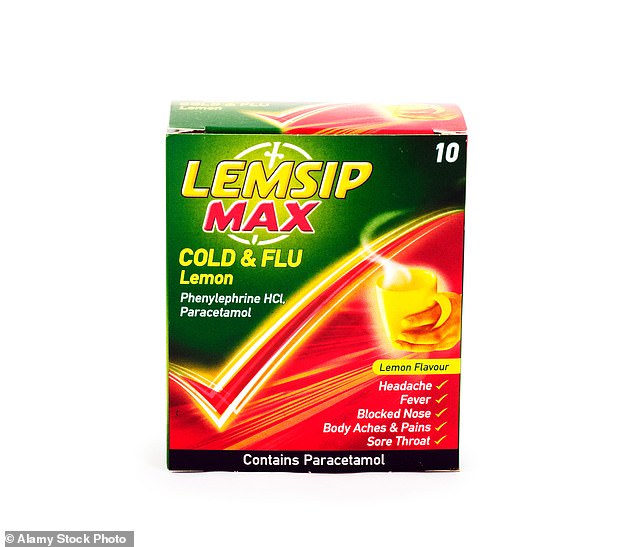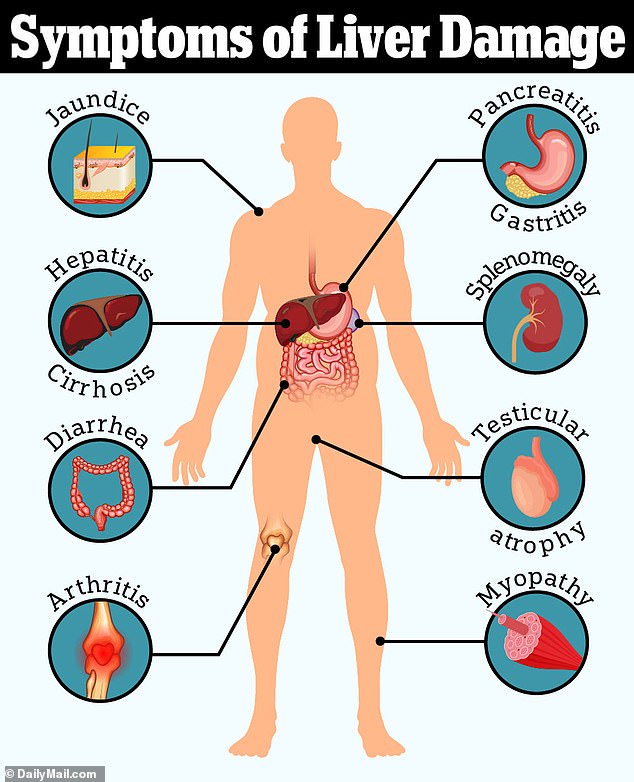Over-the-counter medication taken by millions could put people at risk of stomach ulcers, liver failure and kidney damage if mixed with alcohol, experts have warned.
Everyday remedies such as Lemsip, Strepsils and ibuprofen are safe when used as directed—but drinking while taking them can cause lasting harm, they say.
Kiran Jones, a clinical pharmacist at Oxford Online Pharmacy, urged caution: ‘Mixing over-the-counter meds like cough syrup, cold remedies or painkillers with alcohol can be extremely dangerous—and even deadly.’
Dr Dean Eggitt, a Doncaster GP, echoed the warning: ‘It’s a huge problem and people just don’t recognise the risk.’
Millions turn to painkillers, cough mixtures and cold remedies for everything from headaches to period pain.
The danger comes because many of these products already tax the liver and kidneys as they are broken down, or irritate the stomach lining.
Adding alcohol—which affects the same organs—magnifies the strain and can tip the balance from safe to seriously harmful, experts warn.
So what exactly do you need to avoid—and what are the safer alternatives? We spoke to the experts…

Some of the most commonly taken over-the-counter cold and flu medications could be putting people at risk of liver failure and kidney damage when taken with alcohol, experts have warned

Mixing common cough remedies with alcohol can cause drowsiness, dizziness, stomach upset, trouble breathing, headache and even respiratory failure
Cough syrups
A cough and sore throat are among the most common complaints as the weather turns colder.
But reaching for a hot toddy or glass of wine while also sipping cough remedies could be a serious mistake, pharmacists warn.
Kiran Jones explained that many products—including Covonia, Benylin and some Strepsils—contain dextromethorphan, a cough suppressant.
‘Mixed with alcohol, you could experience drowsiness, dizziness, an upset stomach, trouble breathing, headache, a fast heart rate and impaired co-ordination,’ he said.
‘These effects can last for hours and, if abused, may trigger hallucinations, a drop in body temperature or even respiratory failure.’
Dextromethorphan works by dampening the urge to cough, easing sore throats and helping patients rest—but combining it with alcohol can turn a simple remedy into a serious risk.
If you plan on drinking, avoid remedies with paracetamol, ibuprofen or dextromethorphan, experts say. Safer options include honey and lemon, numbing throat sprays and lozenges until you can take medicine alcohol-free.

Cold and flu remedies and Ibuprofen are taken by millions to alleviate symptoms from headache, fever and body aches and pains, but experts warn that mixing the drugs with alcohol could cause permanent liver damage
Cold and flu remedies
Medicines such as Lemsip—which contains paracetamol—and decongestants like Sudafed are among the most popular choices for easing colds.
But experts warn combining them with alcohol can be a ‘recipe for disaster’, as they often contain a cocktail of ingredients including paracetamol, phenylephrine hydrochloride and guaifenesin.
Dipar Kadmar, a pharmacist and fellow at Kingston University, explained: ‘Even small overdoses, or combining paracetamol with alcohol, can increase the risk of serious harm.’
The danger lies in how the liver processes paracetamol.
As it breaks the drug down, it produces a toxic by-product called NAPQI. Normally this is neutralised by the body, but alcohol puts extra strain on the liver, meaning the toxin can build up and cause potentially life-threatening damage.
Decongestants like phenylephrine are designed to shrink swollen blood vessels inside the nose to make breathing easier. But experts have long questioned their effectiveness, as much of the drug is metabolised in the gut and liver before it even reaches the nasal passages.
If you’ve got a cold and plan to drink, opt for simple fixes like steam inhalation or saline nasal sprays—all of which ease symptoms without putting extra strain on your liver.
 Anti-inflammatories like Ibuprofen
Anti-inflammatories like Ibuprofen
These painkillers are widely used for backache, period cramps, headaches, colds and flu symptoms, and to reduce inflammation from muscle strains.
They work by lowering levels of hormones that cause pain and swelling, but the NHS advises against taking ibuprofen for more than ten days without medical advice.
Dr Dean Eggitt, a Doncaster GP, said the danger comes from the way the drug irritates the stomach lining: ‘Painkillers like ibuprofen are designed to relieve inflammation, but really all they do is irritate the stomach, increasing the risk of painful stomach ulcers which in some cases can lead to peritonitis.’
Alcohol has a similar effect. It relaxes the valve that keeps stomach acid in place, raising the risk of heartburn, reflux and, in heavy users, ulcers.
Combined with regular painkiller use, this can result in serious complications such as peritonitis – an infection of the stomach lining which, if untreated, may be life-threatening.
The British Liver Trust also warns that just two glasses of wine a day can cause fat to build up in the liver.
Ongoing damage, made worse by frequent ibuprofen use, can lead to inflammation and scarring known as fibrosis.
If you need pain relief while drinking, pharmacists recommend gentler options such as hot or cold compresses or rest—and to save ibuprofen for when you are alcohol-free.